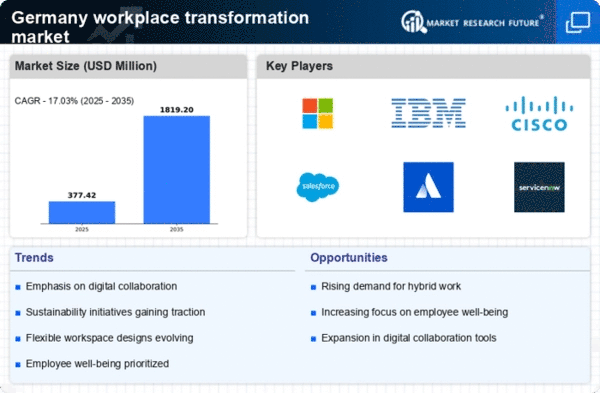Evolving Workforce Expectations
The workplace transformation market in Germany is increasingly influenced by the evolving expectations of the workforce. Employees now seek flexible work arrangements, which include remote work options and adaptable office spaces. This shift is reflected in a survey indicating that over 70% of employees prefer hybrid work models. Companies are responding by redesigning their work environments to enhance collaboration and productivity. As a result, organizations are investing in technology and infrastructure that support these new work styles. This trend is likely to continue, as the demand for flexibility and work-life balance becomes more pronounced, driving further transformation in the workplace transformation market.
Focus on Diversity and Inclusion
The emphasis on diversity and inclusion is reshaping the workplace transformation market in Germany. Organizations are increasingly recognizing the value of diverse teams in driving innovation and improving business outcomes. A recent report indicates that companies with diverse workforces are 35% more likely to outperform their competitors. This realization is prompting businesses to implement inclusive hiring practices and create work environments that celebrate diversity. As organizations strive to foster a culture of inclusivity, they are likely to invest in training programs and initiatives that promote equity. This focus on diversity is expected to be a key driver of transformation in the workplace transformation market.
Regulatory Changes and Compliance
Regulatory changes significantly impact the workplace transformation market in Germany. New labor laws and regulations aimed at improving employee rights and workplace safety are prompting organizations to reassess their operational frameworks. For example, recent legislation mandates stricter health and safety standards, compelling companies to invest in ergonomic office designs and health-focused initiatives. This compliance-driven transformation not only enhances employee satisfaction but also mitigates legal risks. As organizations adapt to these regulatory changes, the workplace transformation market is likely to experience growth, with an emphasis on creating safer and more compliant work environments.
Sustainability as a Core Business Strategy
Sustainability is becoming a core business strategy for many organizations in Germany, significantly influencing the workplace transformation market. Companies are increasingly adopting sustainable practices, such as reducing carbon footprints and utilizing eco-friendly materials in office design. A survey indicates that over 60% of employees prefer to work for companies that prioritize sustainability. This trend is prompting organizations to rethink their operational strategies and invest in green technologies. As sustainability becomes a central tenet of corporate identity, the workplace transformation market is likely to see a surge in demand for environmentally conscious solutions that align with these values.
Technological Advancements in Communication
Technological advancements play a pivotal role in shaping the workplace transformation market in Germany. The rise of digital communication tools and platforms has revolutionized how teams collaborate. For instance, the adoption of cloud-based solutions has increased by approximately 40% in the last year, enabling seamless communication regardless of location. This shift not only enhances productivity but also fosters a culture of innovation. Companies are increasingly investing in advanced technologies such as AI and machine learning to streamline operations and improve decision-making processes. As these technologies continue to evolve, they are expected to further drive transformation within the workplace transformation market.
















